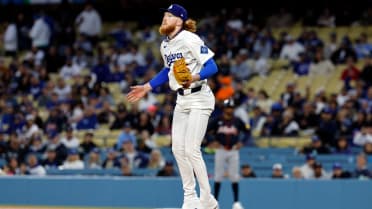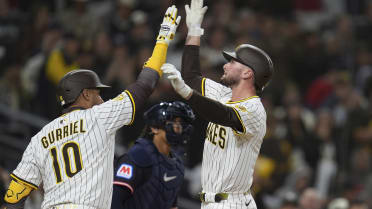Since 2000, there have been only four occasions when a pitcher pulled off the incredible feat of striking out 18 or more batters in a game. Randy Johnson, Corey Kluber and Max Scherzer -- who have a combined 10 Cy Young Awards -- were responsible for three of them. The other happened 16 years ago on this date, via the right arm of Ben Sheets.
Sheets was sensational in a complete-game win against the Braves at Miller Park, using his electric fastball-curveball combination to fan 18 of the 31 batters he faced while allowing only three hits and a walk for the Brewers. Eight of his final nine outs were strikeouts, and he finished the game by punching out five straight hitters.
The dominant effort wasn’t just a one-off for the right-hander. Rather, it was part of a historic 2004 campaign that at the time seemed like the start of something big, before injuries took their toll.
History made
While Sheets was excellent for much of 2004, his season started poorly when he didn’t make it out of the fourth inning on Opening Day against the Cardinals. The righty allowed four runs (three earned) on five hits and three walks in 3 1/3 innings. It was the last time he’d give up more than three runs in a game until June.
After his rough start in St. Louis, Sheets bounced back against the Astros, throwing six scoreless innings and recording double-digit K’s for the first time in his career. Over his last five starts of April, he had 31 K’s with no walks in 32 2/3 innings.
He reached 10 K’s again on May 5 against the Reds, two starts before setting a Brewers single-game strikeout record with his 18-K masterpiece vs. the Braves. Sheets made more history on June 13, becoming the second Brewer to throw an immaculate inning.
Sheets made the NL All-Star team in 2004, and he arguably deserved to start. Here are his first-half stats compared to those of the Astros’ Roger Clemens, who was chosen as the NL’s starting pitcher with the All-Star Game taking place in Houston.
Sheets: 9-5, 123 1/3 IP, 2.26 ERA, 0.89 WHIP, 133 strikeouts, 19 walks
Clemens: 10-3, 116 2/3 IP, 2.62 ERA, 1.18 WHIP, 121 strikeouts, 49 walks
Sheets continued to excel in the second half, posting a 3.17 ERA with a 1.08 WHIP and a 131-to-13 K/BB ratio over 113 2/3 innings. Put it all together and he finished 2004 with a 2.70 ERA, a 0.98 WHIP, 264 K’s and 32 walks in 237 frames.
It marked the sixth time in the modern era (since 1900) that an ERA title qualifier had a K/BB ratio of 8.0 or higher in a season. The mark has been achieved three more times since.
K/BB ratio of 8.0 or higher, single season
ERA title qualifiers, modern era (since 1900)
1. Phil Hughes, 11.63 (2014)
2. Bret Saberhagen, 11.00 (1994)
3. Cliff Lee, 10.28 (2010)
4. Curt Schilling, 9.58 (2002)
5. Pedro Martinez, 8.88 (2000)
6. Greg Maddux, 8.85 (1997)
7. Pedro Martinez, 8.46 (1999)
8. Ben Sheets, 8.25 (2004)
9. Max Scherzer, 8.12 (2015)
It's obviously a good list to be on, especially considering Martinez's 1999 and 2000 seasons are two of the greatest individual pitching campaigns ever.
Targeted for greatness
Sheets’ performance in 2004 validated Milwaukee’s decision to select him with the 10th overall pick in the 1999 MLB Draft out of the University of Louisiana at Monroe, even if the breakout came a little later than expected.
He was the sixth pitcher off the board after Josh Beckett, Josh Girdley, Kyle Snyder, Bobby Bradley and Barry Zito. Other notable pitchers taken in the 1999 Draft include John Lackey (second round), Erik Bedard (sixth), Aaron Harang (sixth) and Jake Peavy (15th).
The righty gained an early taste of the spotlight in 2000, helping Team USA to an improbable gold medal at the Summer Olympics in Sydney, Australia. Facing a heavily favored Cuban team in the gold medal game, Sheets threw a three-hit shutout.
He debuted in the Majors the following season, starting off strong and making the National League All-Star team with a 3.59 ERA in the first half. However, he posted a 7.06 ERA over his final nine starts and was a slighty below league-average arm over 2002-03 (97 ERA+).
As a result, his 2004 success came as a surprise, despite his prospect pedigree. He was also largely overlooked in the NL Cy Young Award voting at the end of the year.
2004 NL Cy Young vote
No matter what metrics you use, Sheets was one of the best hurlers in the NL in 2004. He finished first in the league in K/BB ratio, second in strikeouts and FIP (2.65), and third in ERA and innings. He also ranked second in bWAR (7.2) among NL pitchers.
However, Sheets went 12-14 for a 67-94 Brewers club that finished in last place for the third straight year. Back then, a pitcher’s win-loss record had a much greater impact on his Cy Young Award candidacy than it does today, so Sheets didn't get much recognition, tying reliever Brad Lidge (29 saves, 1.90 ERA, 157 K’s) for eighth place in the Cy Young race with one vote point.
Clemens, who went 18-4 with a 2.98 ERA, a 1.16 WHIP and 218 K’s over 214 1/3 innings, won his record seventh Cy Young Award, edging Randy Johnson (16-14, 2.60 ERA, 290 K’s) and Roy Oswalt (20-10, 3.49 ERA, 206 K’s).
Jason Schmidt (18-7, 3.20 ERA, 251 K’s), Carlos Zambrano (16-8, 2.75 ERA, 188 K’s), Carl Pavano (18-8, 3.00 ERA, 139 K’s) and Eric Gagne (45 saves, 2.19 ERA, 114 K’s) also finished ahead of Sheets.
Post-2004
Coming off his terrific 2004 season, Sheets signed a four-year, $38.5 million contract with the Brewers in April '05, which at the time represented the richest deal in franchise history. But a series of injuries -- a viral infection and a torn back muscle in 2005, a right shoulder strain in ‘06 and a right middle finger sprain in ‘07 -- limited him to just 404 innings over the next three years.
As the ailments piled up, Sheets continued to show flashes of brilliance. In 2006, he posted a 10.55 K/BB ratio, the fourth-highest single-season mark in the modern era among pitchers who threw at least 100 frames. Two years later, he stayed healthy for 31 starts and recorded a 3.09 ERA over 198 1/3 innings, although his bat-missing ability had started to decline by then.
Sheets would have received his first chance to pitch in the postseason in 2008, as a July trade for CC Sabathia gave the club enough firepower to win the NL Wild Card. But he suffered an elbow injury late in the season and wasn’t available in the NL Division Series against the Phillies, who topped the Brewers, three games to one.
Sheets then underwent surgery to repair a torn right flexor tendon and missed all of 2009. He returned in 2010 with the Athletics and was starting to find a groove after an inauspicious start to the year, but his comeback attempt was stalled when he underwent Tommy John surgery.
After another full season on the sidelines, Sheets worked his way back to the big leagues again in 2012 with the Braves, joining the club’s rotation in July and registering a 3.54 ERA over his first eight starts. However, right shoulder tendinitis knocked him out for all of September. He made one final appearance on Oct. 3, throwing a scoreless first inning with two strikeouts against the Pirates, before calling it a career at age 34.
Over 250 games as a big leaguer, Sheets recorded a 3.78 ERA with a 1.22 WHIP and 1,325 strikeouts in 1596 2/3 innings. He's not going to go down as the most accomplished pitcher from his Draft class or debut year, much less his generation. But for a brief time, he was on par with some of the greatest arms ever to take the mound.
Thomas Harrigan is a reporter for MLB.com.




